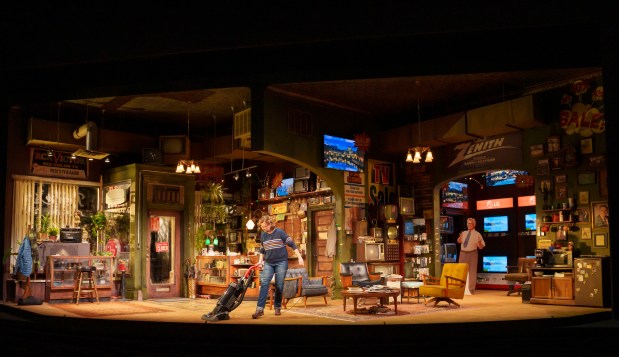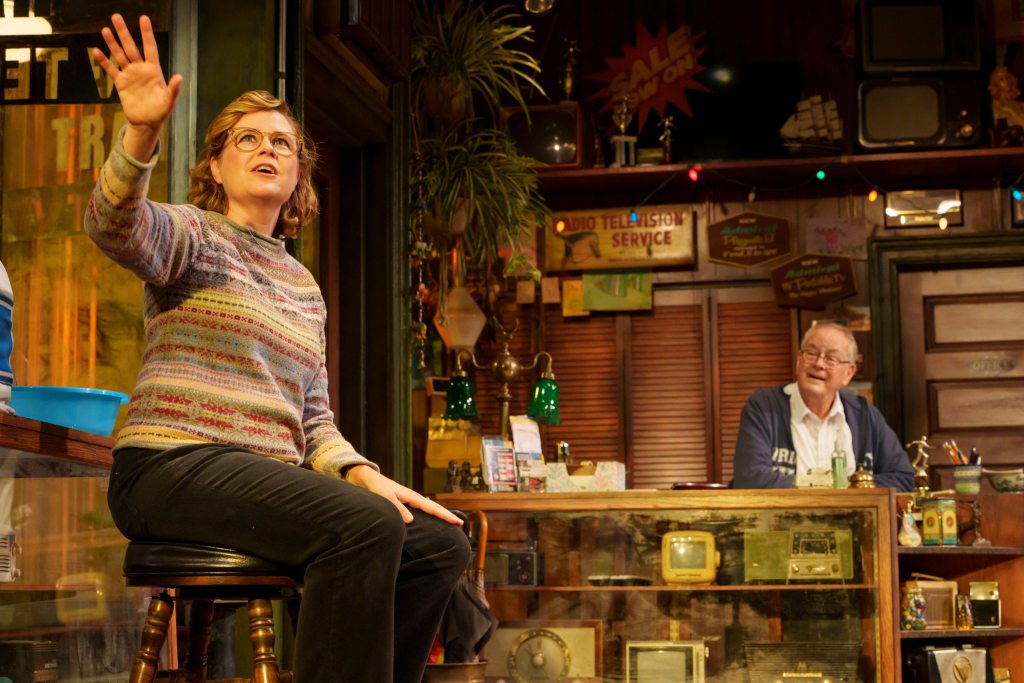Given the undeserved assaults from without that Chicago has taken of late, there’s something reassuring about settling into a sentimental, old-school Chicago play, filled with references to the Cubs, the Bears, the Hawks, the eponymous wind, the frigid winters, da’ mayors, the Trib, The Refrigerator, Fullerton Avenue, the CTA and even the colorful local and fiercely independent retailers whose promotional campaigns collectively form a part of Chicago’s shared memory.
The declining, demi-tragic hero of playwright Lee Kirk’s entertaining “Ashland Avenue,” which had its world premiere Monday night at the Goodman Theatre with Francis Guinan and Jenna Fischer (“The Office”) in the lead roles of needy dad and a daughter (Sam) wanting to break out on her own, is a fictional purveyor of televisions. But he is supposed to put you in mind of “5-8-8, 2-300, Empire!” or Mad Max Madsen or Bob ROAR-man or “You Bought It at Polk Bros.” or whatever else sits in dormant Middle-West brain cells.
Kirk and Fischer, who is his wife, live in Los Angeles and, to be frank, you can tell that Kirk’s vision for his storefront dramedy is drawn more from sepia-toned memory than current lived reality. The cultural references, exploded at the Goodman on Kevin Depinet’s hyper-realistic set, are specific enough to function, but they’re not of the Chicago moment. But then, neither is the leading character, a grumpy dude who has served his community’s TV-buying needs for decades with distinction, but who now has seen his little kingdom dwindle from a chain down to one solo store, where he hangs on for dear life as the internet eats his soul, as he tries to compel his married daughter to stick at his side rather than pursue her own creative dreams in — you will be less than shocked to hear — Los Angeles.
This whole notion of Chicago as a creative community with a ceiling that an ambitious artist must rise above is both a cliche and a hard truth, of course. And this is hardly the first play to probe the issue. At times, “Ashland Avenue” recalls Tracy Letts’ “Superior Donuts,” a play that used donuts rather than TVs as its baked-in-Chicago symbol, but that shared the same sentimental soul. “Superior Donuts” was turned into a sitcom and you could see the same happening here.
Lots of plays and TV shows are about what has been described as the old king/young king ritual, where the elder party tries and fails to let go while the more youthful party struggles to gain power and influence. In tragedies, the focus is on the howls of the former. In comedies, it’s on the ultimately successful endeavors of the latter. In plays like this one, it goes back and forth, although I’d like to see more of Fischer’s Sam, especially in battle mode.
 Jenna Fischer in “Ashland Avenue” at Goodman Theatre. (Todd Rosenberg)
Jenna Fischer in “Ashland Avenue” at Goodman Theatre. (Todd Rosenberg)
To be frank, though, I saw “Ashland Avenue” within 24 hours of watching the grand cinematic finale of the “Downton Abbey” franchise, a movie that has so many characters struggling with when and how to hang up their pots or pans or their manor house that you want to shout at the screen, “Stick around already, you still can cook / manage / order people around.” Guinan’s Pete has all the same problems: he’s trying to come to a realization that it’s over, he’s had a good run and it’s time to turn off the cable box (one is metaphorically smashed as part of the play), close up shop on Ashland and let the kid and her animator husband (the aptly animated Chiké Johnson) do their thing in La La Land while he puts his feet up and watches the Bears.
Often, the play, directed by Susan V. Booth, feels more of a draft in need of some judicious cutting than a finished work. At two hours and 35 minutes, it’s at least 20 minutes too long, not least because the “We need to leave” / “Please don’t leave me” back-and-forths start to feel repetitive. Cut away the weeds and we’d better appreciate Kirk’s considerable skills with language. The play has two other characters who mix things up: one is a young woman (Cordelia Dewdney) whom widower Pete has befriended in a slightly weird way and the other is a mysterious young man (Will Allan) who maybe Phil can help, too, if the guy will let him. They are an interesting and connected pair of Chicago characters, enriched by two intense performances.
Jenna Fischer of ‘The Office’ returns to the stage for ‘Ashland Avenue’ at the Goodman Theatre
Fischer is generous and ensemble-minded on stage and comes with the deadpan sense of humor her legion of fans admire. Fans of Chicago theater hardly need reminding of Guinan’s quality as an actor, although I think his Pete, albeit moving, leans too much into sad and pitiable old man, replete with plaid shirt and suspenders, when the play actually seems to be describing a smart if profoundly manipulative Chicagoan who could still be a real player in all kinds of ways, personal and professional, if only the world had not made the mistake of changing.
I say scrub the Santa Claus at Marshall Fields business and give the guy a hairpiece, a sexy 1980s shirt, the chutzpah of a Mamet-esque salesman and more bite.
Every Chicagoan knows the type.
Chris Jones is a Tribune critic.
cjones5@chicagotribune.com
Review: “Ashland Avenue” (3 stars)
When: Through Oct. 12
Where: Goodman Theatre, 170 N. Dearborn St.
Running time: 2 hours, 40 minutes
Tickets: $33-$148 at 312-433-3800 and goodmantheatre.org
